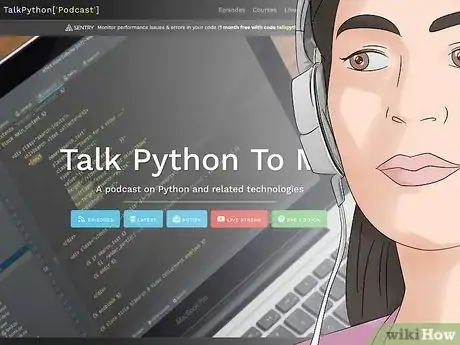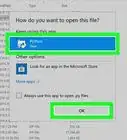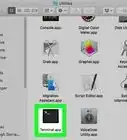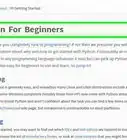This article was co-authored by wikiHow staff writer, Nicole Levine, MFA. Nicole Levine is a Technology Writer and Editor for wikiHow. She has more than 20 years of experience creating technical documentation and leading support teams at major web hosting and software companies. Nicole also holds an MFA in Creative Writing from Portland State University and teaches composition, fiction-writing, and zine-making at various institutions.
Learn more...
As a Python developer, it's important to stay up to date with the latest news and trends. If you're just learning Python, a busy developer working on other projects, or just looking to sharpen your career skills, there are plenty of great Python resources that will help you stay current. This wikiHow guide will cover the best news sources, podcasts, Python groups, and community tools for staying up to date on Python news, coding trends, releases, and more.
Things You Should Know
- Python.org, the official Python website, is home to hundreds of Python mailing lists, as well as a blog for announcements and release info.
- Listen to Python podcasts like Python Bytes and Code Newbie for news, career advice, trends, and expert interviews.
- Participate in the Python community by joining regional Python user groups, subreddits, and LinkedIn groups.
Steps
Check Python.org for official news.
-
The official Python website is the best place to get the latest Python news. The News section is home to official Python announcements, including releases, community news, and event listings. The most important Python developments are announced in the News section—check it once a week (at least) to stay current.
- Add a bookmark to https://blog.python.org for a quick shortcut to core development news and information.
Listen to Python podcasts.
-
There are tons of great Python podcasts available on all podcasting platforms. You can do a quick search in your favorite podcasting app for "python," or check out some of the most popular Python-related podcasts, all of which are available on Spotify, Apple Podcasts, and Google Podcasts:
- Talk Python to Me Podcast: A weekly podcast dedicated to coding in Python, complete with coding tips, interviews, and more.
- PythonBytes: Brought to you by Talk Python to Me, this shorter-form podcast is dedicated to bringing you the latest headlines and other industry news.
- The Real Python Podcast: A weekly Python podcast full of coding tips, interviews, and conversation about the Python community.
- Teaching Python: A beginner-friendly Python podcast created by two middle school teachers who are both learning and teaching Python.[1] X Research source
- Code Newbie: This podcast isn't strictly Python-related, but it's a great resource for learning about coding tricks and techniques, industry trends, and career-boosting skills.
Join a Python user group in your area.
-
No matter your skill level, there's a Python user group for you. Region-specific Python groups meet in person to talk, code, participate in events, plan projects, share career tips, and more. Many groups also have active presences on social media, MeetUp sites, and/or mailing lists.[2] X Research source Check out Python's list of over 1,600 regional user groups all over the world to see what's available in your area: https://wiki.python.org/moin/LocalUserGroups
Sign up for mailing lists.
-
Fill your email inbox with Python news and discussions. Python.org hosts hundreds of mailing lists, from simple newsletters from Python's core developers to busy discussions and support groups. You'll find mailing lists for industry-specific topics like Python in Education, and more.
- news-bugs-announce: Sign up for this announcement-only list to learn about the latest bugs.
- python-list: This high-traffic discussion list is a great way to join and read discussions about Python.
- Tutor: A beginner-friendly discussion list on which you can ask and answer questions about programming with Python.[3] X Research source
- For a weekly digest of Python news, check out Python Weekly.[4] X Research source
- For a full list of special interest mailing lists, see https://www.python.org/community/sigs.
Read news and blogs.
-
Something new is always happening in the Python community, so stay on top of the headlines. Sites like Planet Python aggregate Python-related news from many sources—bookmark the site or add it to your RSS reader. Blogs are also a great way to learn about news, ideas, bugs, and the industry in general. Some popular Python blogs are Real Python, Mouse Vs. Python, PyBloggers, Toward Data Science, Ned Batchelder's blog, and Planet Python.
- If you use a news-reading app, like Google News or Apple News, follow the Python keyword, as well as other keywords you're interested in—machine learning, data science, etc.—to see headlines as they happen.
- Feel like writing some code? You can use the News API module in Python to fetch news from sources like Reuters, BBC, and more.[5] X Research source Download the libraries from https://github.com/mattlisiv/newsapi-python.
Join Python subreddits.
-
Get involved in the Python community on Reddit. On /r/python and r/pythoncoding, you can keep up on news, projects, get coding tips, and more. If you want to ask questions or see what others are working on, /r/pythonhelp and /r/learnpython are great learning-related discussion forums. You can browse these subreddits without a Reddit account, but you'll need to sign up to join the conversation.
Attend conferences and events.
-
There are official and unofficial Python events all over the world. Python conferences are a great place to network with industry experts, learn new skills, hear the latest news, and make new friends. If there isn't a Python conference in your area, you might be able to plan a trip with your local Python group.
- Check Python.org's list of events at https://www.python.org/events for official upcoming conferences and workshops.
- Many Python events are special interest-specific, meaning that you might find an event that's more tailored to your interests than a more general conference. For example, PyLadies, a Python group for women, hosts community meetups in many countries.[6] X Research source
Use LinkedIn to join Python groups and follow developers.
-
Tons of Python developers are active on LinkedIn. This makes LinkedIn a great resource for beginners and experts alike. The largest Python group on LinkedIn is the Python Developers Community, a moderated community of over 1 million users. You can also join niche groups like Python Web Developers, Python Professionals, Scientific Python, and Python Data Science, and follow developers and data scientists who share advice, ideas, and job listings.
Follow the pros on social media.
-
The Python community is active on sites like Twitter, TikTok, and YouTube. Follow Python leaders on Twitter to stay current on the latest Python developments, and use YouTube tutorials to brush up on your coding skills and get helpful career advice. Just search any of these platforms for python or your particular industry, and give the best creators a follow.
- Yes, TikTok is home to a wealth of Python information! Even if you're an old pro, there's always something you can learn from the newest generation of coders.
Read books to keep your skills sharp.
-
Hone your coding skills with some great Python books. Whether you like reading physical books or prefer using your Kindle or other e-reader, there are plenty of Python books you can read to keep your knowledge fresh, especially if you're not using Python for work on a daily basis. Check out Pythonbooks.org for some great recommendations, or read any of these popular titles:
- The Hitchhiker's Guide to Python (O'Reilly)
- Python Cookbook (O'Reilly)
- Fluent Python (O'Reilly)
- Automate the Boring Stuff (Al Sweigart)
- Practices of the Python Pro (Dane Hillard)
You Might Also Like

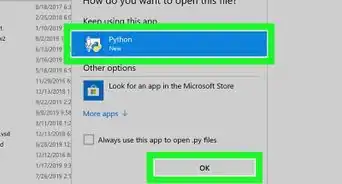
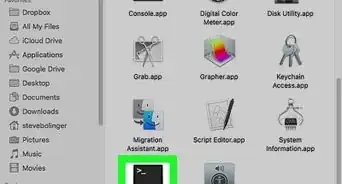 How to See the Python Version on Windows, Mac, and Linux
How to See the Python Version on Windows, Mac, and Linux
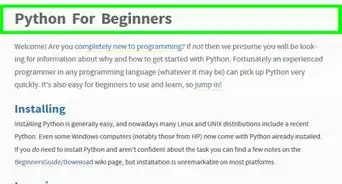
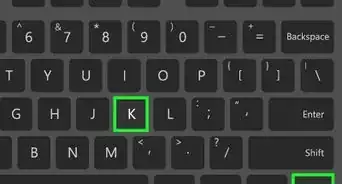 How to Comment Out Multiple Lines in Python: Formatting & Shortcuts
How to Comment Out Multiple Lines in Python: Formatting & Shortcuts
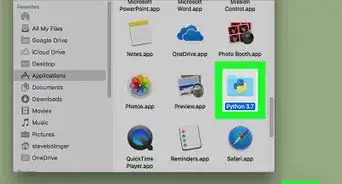
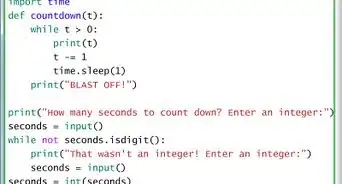
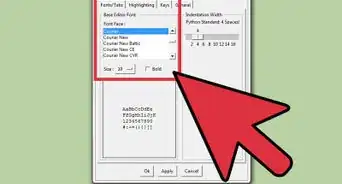



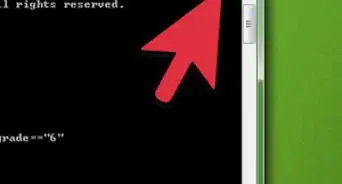

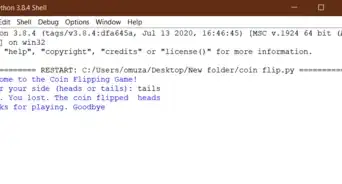
References
About This Article

